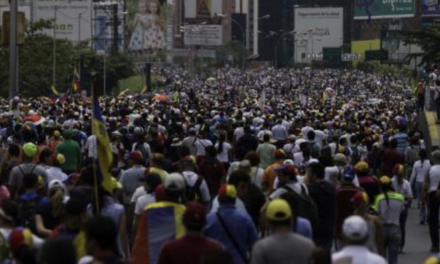This week Aquí Cabemos Todos a group of scholars and activists released a diagnosis of the Venezuelan conflict and urged the construction of a space of negiotiation that includes all of Venezuela’s social and political actors. See the original Spanish version published on EfectoCocuyo.com.
WE ALL FIT HERE!!
IN DEFENSE OF THE REPUBLIC:
NATIONAL UNITY, NEGOTIATION, AND DEMOCRATIC TRANSITION
Confrontation, socio-political violence, and the crisis of governability are all accelerating in Venezuela. At the same time that the precariousness of food and medicines increases, so does the systematic violation of human rights by organisms in charge of guaranteeing them, as well as by the anarchic actions of individuals, gangs and paramilitary groups, which cause pain and social indignation in the entire country, with attacks, looting and death.
Numerous international organizations and diverse sectors of national life–unions, human rights organizations, academia, education, sanitary, communitarian, religious, communicational, syndicates, etc.–have warned about the risks that this increase in violence presents. The situation has been aggravated by the government’s decision to impose, through illegal procedures and the support of the National Electoral Council, a corporatist Constituent Assembly as a resource to turn into a majority what is clearly a minority of the country, and in this way strengthening their forces with the evident political and military purposes of consolidating absolute control of state and society.
The expansion of repressive actions, exercised with pseudo-legal appearances—for example the unconstitutional and illegal aggressions and failure to respect the Attorney General and the National Assembly—worsen the divisions within Venezuelan society and contribute to the failed state we are suffering. They incentivize the emergence of a parallel state on the part of those forces that are opposed to this totalitarian project. This context could favor massive episodes of violence in the struggle for resources and territory, episodes that are difficult to control and which could overwhelm institutional measures and lead to another of the intra-state conflicts and fratricidal wars that are occuring around the world.
To this confrontation between State institutions (the Executive Branch, the Judiciary, the Comptroller’s Office and the Ombudsman’s Office on the one hand, and the Legislative Branch and the Attorney General’s Office on the other), we can add the multiple and diverse sectors that resist with tenacity and commitment, the militarist and authoritarian push, in the streets and in other social spaces, ranging from opposition groups and parties organized or not around the opposition coalition MUD, to dissident groups and dissident legislators and critics of Chavismo.
In this diverse and plural setting with different ideological perspectives, but also coexisting in a confrontational context that is increasingly harsh and violent, we must construct a space of negotiation, of national unity, that guarantees a pacific and democratic transition, a space that leads to conversations, understandings, and possible negotiations among all of the actors in dispute without exception, with adequate technical and international support. This effort will strengthen the Republic and lead to a necessary transition government.
Here, in this effort to construct an inclusive, democratically sustainable peace, we all fit. Together and united, those citizens who defend the principles of justice, peace, and human rights contemplated in the 1999 Constitution—which today serves as our social pact and guide for national reconstruction—are being called upon.
Arnaldo Esté, Alberto Lovera, Ignacio Avalos, José María Cadenas, Francisco Alfaro, José Virtuoso, S.J, Luis Lander, Luzmely Reyes, Margarita López Maya, María Teresa Urreiztieta, Mireya Lozada, Rafael Uzcategui, Verónica Zubillaga.
Caracas, July 6 2017
Personal and institutional adherence can be sent to: cabemostodosvenezuela@gmail.com




